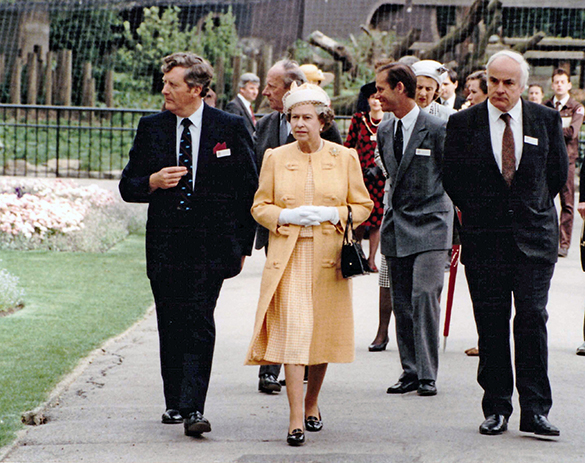Welcome!

Dr. David Jones leads Queen Elizabeth II on a tour at the London Zoo when he was director there. This one was in 1990. Contributed photo
Dr. Jones remembers Queen Elizabeth II
ASHEBORO — Lots of people in Asheboro know that Dr. David Jones was once director of the London Zoo. But how many realize he had multiple encounters with Queen Elizabeth II?
Now retired director of the North Carolina Zoo, Jones spent years at the London Zoo, 15 of them as veterinarian before becoming director. He came to Asheboro in 1994 to lead the NC Zoo.
After Queen Elizabeth died Sept. 8 at the age of 96, Jones was remembering his time in London when he often rubbed shoulders, figuratively speaking, with members of the royal family. He shared some of those memories last week from his Asheboro home.
As veterinarian at the London Zoo, he said, one of his duties was to advise the Buckingham Palace staff on exotic birds, which included about a dozen flamingos and their complicated diet.
“I went to talk to the keeper of the birds,” Jones said. “Then a figure suddenly appeared in a scarf and long raincoat. I had a long conversation with the queen about the diet of flamingos.”
But, Jones said, he first met Queen Elizabeth when he was just 8 years old. He had been selected to be a choir boy at St. Paul’s Cathedral in London. But it was just prior to Elizabeth’s coronation to the throne and the choir leaders “didn’t want to take a new boy for the coronation. Otherwise, I would have sung at her coronation.”
But during his time in the choir, there were a number of services hosted by the Queen Mother, who was patron of the cathedral. Sometimes the queen would attend.
“The boys quite often sang at Buckingham Palace and several times I met her. But I was completely awed by Buckingham Palace.”
Thirty years later, Jones was the zoo director at a time when Queen Elizabeth was patron of the zoo and Prince Philip was chair of the board of trustees. “Every time there was a new exhibit, they would come to open it,” Jones said. “There would be a reception and I met her.
“I introduced her at a couple of events of the Fauna and Flora International, the oldest conservation organization in the world,” he said. “She was patron. And there were a number of other events,” mostly dealing with conservation, with receptions to allow people to meet the queen.
As part of his wildlife and zoo management consultation, Jones spent much time in Middle Eastern nations to talk about conservation. When the king of Saudi Arabia and the emir of Qatar visited Britain on separate occasions, Jones and his wife Janet were invited to their state dinners with the queen.
Jones had occasion to meet with others in the royal family, including Princess Diana. “Sometimes I would get a phone call from the palace and a voice would ask, ‘Can Diana bring the boys (William and Harry) for a look at the zoo?’ Of course they could.”
Jones would then take them for a tour of the zoo. “(Diana) was wonderful, such a nice person, very ordinary.”
For 17 years in London, Jones was chair of the Brooke UK, an equine welfare charity which works to save endangered horses. Camilla, wife of King Charles III and now queen consort, was patron of the organization.
When Jones wanted to start Brooke USA in 2015, Camilla helped him launch the organization at Churchill Downs, home of the Kentucky Derby. “She’s very down-to-earth, a great character,” he said of Camilla.
But Elizabeth was a person like none other and worked hard at her job. People who met her, Jones said, had “huge respect, bowed, said ‘yes ma’am.’ But she was very easygoing and put you to rest. She always led the conversation. She had an enormous knowledge of what was going on around the world
“She was very easy to talk to and had no shortage of topics,” he said. “She would ask where did you come from, did you have children, your particular circumstances.
“She would have been briefed on who she was going to meet and she had to be very disciplined, moving along a (greeting) line, making sure people weren’t being ignored.”
Jones said Elizabeth was “very good at remembering people, their context.” As for the London Zoo, “She would ask about the many animals and plans coming up.” Jones said she talked to him about his work helping other countries with conservation.
“One of the most notable things about her was (giving her opinion) without upsetting people. She would never express her views in a way that would embarrass people.”
Jones said the burdens of being queen with so many people wanting to see her is one “reason she loved Balmoral,” her country estate in Scotland, where she chose to die. “She could get away from the constant bombardment of royalty. She never sought the limelight but was very hard-working.
“She was so well-respected,” Jones said. “She hasn’t been tainted” by the issues of other members of the royal family.
“She was a great lady,” he said. “She was the epitome of good leadership.”
